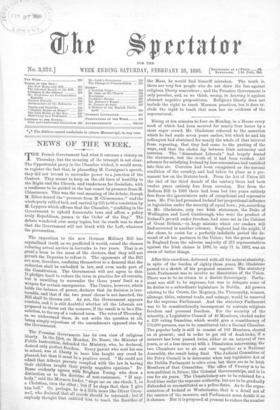Rising at ten minutes to four on Monday, in a
House every nook of which had been secured for nearly four hours by a most eager crowd, Mr. Gladstone referred to the assertion which he had made seven years earlier, but which he and his colleagues had abstained for nearly the whole of that interval from repeating, that they had come to the parting of the ways, and that the choice lay between Irish autonomy and coercion. The "dissentient Liberals" had largely denied the statement, but the truth of it had been verified. All schemes for satisfying Ireland by less concessions had vanished into thin air. Coercion had been recognised as the normal condition of the country, and had taken its place as a per- manent law on the Statute-book. From the Act of Union till the end of the third decade of the century there had been twelve years entirely free from coercion. Bat from the Reform Bill to 1886 there had been but two years entirely free from the ignominious note of exceptional and repressive laws. Mr. Pitt had promised Ireland her proportional influence in legislation under the security of equal laws ; yet, according to Mr. Gladstone, only two Irish statesmen, the Duke of Wellington and Lord Castlereagh, who were the product of Ireland's growth under freedom,'had since sat in the Cabinet of Great Britain,—(a huge mistake which our readers will find corrected in another column). England had the might, if she chose, to resist for a perfectly indefinite period the de- mand of all her partners in the Union ; but the great change in England from the adverse majority of 211 representatives against the Irish claims in 1886, to only 71 in 1892, was an omen of better things.


































